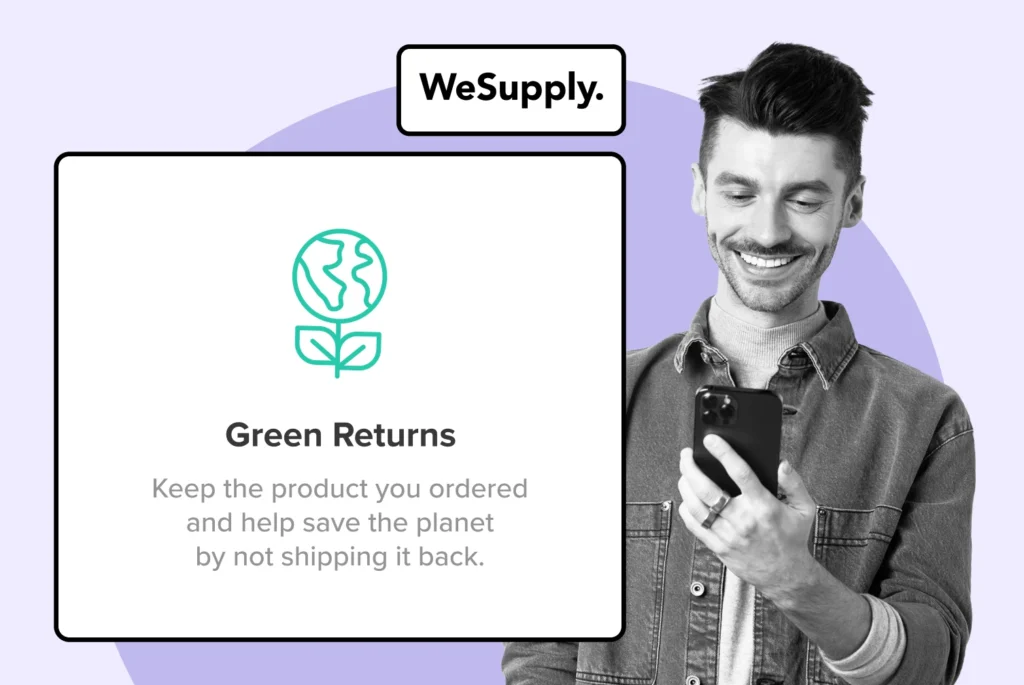
Mastering the Challenge: How to Effectively Manage Returns for Custom Made Products
How to manage returns for custom-made products: from establishing transparent policies to applying effective quality control measures!
Shipping, Tracking & Notifications
Boost customer experience and reduce support tickets
Realtime order and shipment tracking
Proactive order and shipping notifications
AI-Enhanced Discounted Labels
Predictive pre-purchase estimated delivery dates
Self-Serivce branded order tracking
Effortless experience delivered
Identify and Resolve Order Issues
Realtime order and shipment tracking
Make returns profitable and delight customers
Flexibility to define any return destinations & conditions
Simplify returns for your customers and team
Incentivize exchanges over returns
Returns management made easy for your team
Returns management made easy for your team
Easy claims and smart upsells
Understand why your customers are returning
In-Store & Curbside Pickup
Unify the online and the in-store experience
Hassle-free pickup experience for customers
In-Store dashboard to keep operations streamlined
In-Store and Online orders unified
Drive foot-traffic to your stores
Shipping, Tracking & Notifications
Boost customer experience and reduce support tickets
Realtime order and shipment tracking
Proactive order and shipping notifications
AI-Enhanced Discounted Labels
Predictive pre-purchase estimated delivery dates
Self-Serivce branded order tracking
Effortless experience delivered
Identify and Resolve Order Issues
Realtime order and shipment tracking
Make returns profitable and delight customers
Flexibility to define any return destinations & conditions
Simplify returns for your customers and team
Incentivize exchanges over returns
Returns management made easy for your team
Returns management made easy for your team
Understand why your customers are returning
In-Store & Curbside Pickup
Unify the online and the in-store experience
Hassle-free pickup experience for customers
In-Store Dashboard to keep operations streamlined
In-Store and Online orders unified
Drive foot-traffic to your stores
Boost customer experience and reduce support tickets
Realtime order and shipment tracking
Proactive order and shipping notifications
AI-Enhanced Discounted Labels
Predictive pre-purchase estimated delivery dates
Self-Serivce branded order tracking
Effortless experience delivered
Make returns profitable and delight customers
Flexibility to define any return destinations & conditions
Simplify returns for your customers and team
Incentivize exchanges over returns
Returns management made easy for your team
Equip your team for precise return checks.
Easy claims and smart upsells
Understand why your customers are returning
Unify the online and the in-store experience
Hassle-free pickup experience for customers
In-Store Dashboard to keep operations streamlined
In-Store and Online orders unified
Drive foot-traffic to your stores
Find the answer to all your questions
Take a step by step trip through our functionality to see how we can improve your ecommerce processes.
Explore the most comon questions about WeSupply
Calculate the ROI that WeSupply can bring you
Read actionable articles on how to optimize your post-purchase experience and decrease support tickets
Get inspired by stories of how our customers implemented an effortless post-purchase experience
Wondering if WeSupply is a good fit for you? Read through our use cases to see how we can help you increase conversion & improve CX!
A Deep Dive into Top Companies' Order Tracking & Returns Strategy
Find the answer to all your questions
Explore the most comon questions about WeSupply
Calculate the ROI that WeSupply can bring you
Request a no strings attached review of your current shopping experience and missed conversion opportunities
Take a step by step trip through our functionality to see how we can improve your ecommerce processes.
Read actionable articles on how to optimize your post-purchase experience and decrease support tickets
Get inspired by stories of how our customers implemented an effortless post-purchase experience
A Deep Dive into Top Companies' Order Tracking & Returns Strategy
Wondering if WeSupply is a good fit for you? Read through our use cases to see how we can help you increase conversion & improve CX!

Ecommerce returns are a sustainability crisis in the making, with consequences that cannot be ignored. In this article, we lay out practical approaches to foster sustainability in ecommerce returns, directly addressing the need for efficiency, customer involvement, and innovative solutions. With environmental stakes higher than ever, discover how your business can adapt its returns process to be part of a greener ecommerce future.
The environmental impact of e-commerce returns is considerable, with billions of pounds of returns ending up in landfills and contributing significantly to CO2 emissions, highlighting the need for sustainable practices such as providing detailed product information and incentivizing customers to keep purchases.
Implementation of sustainable strategies including eco-friendly packaging, optimized reverse logistics, and product recycling can greatly reduce waste and emissions, with companies like WeSupply illustrating the success of such initiatives.
Leveraging technology, such as virtual sizing and returns management systems, can reduce return rates, enhance customer satisfaction, and contribute to sustainability, while clear communication of efforts and measurable goals are key for transparency and continuous improvement in sustainability performance.
WeSupply leads in sustainable eCommerce returns by combining Returns Analytics, custom policies, and Green Returns. It promotes environmental responsibility with features like the Self-Service Returns Process and intelligent dispositions, streamlining operations while minimizing waste. The platform’s integration capabilities and a Branded Returns Portal enhance customer experiences and operational efficiency. By leveraging WeSupply, businesses can improve sustainability, customer satisfaction, and return management. Ready for a greener returns process? Get Started with WeSupply.
The convenience and accessibility of online shopping have revolutionized the retail landscape. However, the thrill of clicking ‘buy now’ often overshadows the environmental cost of online purchases. Studies reveal that people return 30% to 50% of clothing they purchase online, leading to a significant environmental impact. The grim reality is that annually, about 9.5 billion pounds of returned items end up in landfills, contributing to waste. Furthermore, e-commerce returns are responsible for around 24 million metric tons of CO2 emissions globally each year, equivalent to the emissions from 5.1 million cars.
The ‘Buy, Try, and Return’ mentality, prevalent among online shoppers, has exacerbated the environmental challenges associated with ecommerce returns. The key to transforming this scenario lies in addressing two critical factors: environmental concerns and consumer preferences. A closer look reveals an encouraging trend. Millennials, in particular, show a strong preference for brands that embrace purpose and sustainability, with some sustainable product categories experiencing twice the growth of their traditional counterparts.
However, the journey towards a greener ecommerce industry is not without challenges. While 65% of consumers express a desire to buy from purpose-driven brands that advocate sustainability, only about 26% follow through with such purchases. This dichotomy between intent and action underscores the need for online retailers to nudge consumers towards sustainable behaviors.
To reduce environmental impacts, retailers can:
Provide comprehensive product information
Incentivize customers to keep purchases
Ensure returned items are resold, donated, or recycled instead of being landfilled.
Simultaneously, consumers can play their part by shopping in-store where possible, being committed to online purchases before buying, and dropping off returns to cut down on last-mile shipping emissions. To encourage customers in sustainable purchasing, companies can use social influence, shape good habits, leverage the domino effect, appeal to emotions or rationality, and promote experiences over ownership.
In essence, the growing need for sustainable ecommerce returns is not just a trend but a necessity. It’s a call for a paradigm shift in the ecommerce industry, where environmental stewardship and customer satisfaction coexist. It’s an endeavor that requires the collective efforts of online retailers, customers, and all stakeholders in the ecommerce ecosystem.
WeSupply tackles the need for sustainable e-commerce by offering features that reduce waste and enhance customer convenience. Its Green Returns initiative allows refunds without the need to return items, reducing landfill waste. The “Buy Online, Return In Store” feature cuts shipping emissions, and automatic return label generation streamlines the process.
Key features include:
Buy Online, Return In Store: Offers an eco-friendly return option that reduces shipping emissions and enhances customer convenience.
Generate Return Labels Automatically: Facilitates easy returns and minimizes operational disruptions, promoting a more sustainable returns process.
A critical step towards sustainable ecommerce returns lies in the implementation of eco-friendly packaging. Eco-friendly packaging refers to packaging solutions that minimize environmental impact by using designs and sustainable materials that are recyclable, biodegradable, and produced with renewable energy. Common materials include recyclable papers and cardboard, plant-based bioplastics, biodegradable plastics, and plant fibers such as jute and cotton. Moreover, inflatable air pillows made from post-consumer recycled materials and corrugated bubble wrap from recycled cardboard are alternatives to traditional plastic protective packaging.
Implementing eco-friendly packaging involves:
Careful selection of materials
Minimization of design to reduce waste
Use of sustainable inks like soy-based inks
Reducing packaging weight to lower shipping costs
Sizing the packaging appropriately to the product to prevent the need for additional filler materials, which can be difficult to recycle and increase shipping expenses.
The next pillar of sustainable return strategies is optimized reverse logistics. Optimizing reverse logistics for sustainability can significantly reduce environmental impact, improve economic performance, and enhance social responsibility. Automation in reverse logistics can streamline processes, reduce human error, and enhance health and safety for workers, leading to better customer satisfaction and trust. Transparency in the reverse logistics process can improve customer satisfaction and brand loyalty, as well as minimize digital carbon footprint through efficient communication. By working with reverse logistics companies, businesses can ensure that their return processes are sustainable and efficient.
Lastly, businesses should focus on product recycling. Establishing a closed-loop supply chain that focuses on a circular economy can reduce landfill waste by facilitating the reuse or resale of returned products. Promptly processing returned products and moving them onwards through recommerce or charitable donations can minimize the waste generated, especially e-waste, and generate revenue from residual value.
WeSupply aids in implementing sustainable return strategies through intelligent dispositions, eco-friendly practices, and automated processes. Its smart system ensures that returned items are directed to suitable channels like recycling centers, minimizing waste. The platform also supports restocking during the return process, promoting efficiency and reducing unnecessary waste. Additionally, WeSupply’s automated returns feature streamlines the entire process, saving time, reducing fraud, and minimizing human error, contributing to a more sustainable and efficient operation.
Key features include:
Intelligent Dispositions: Directs returns to recycling or appropriate channels for a positive environmental impact.
Eco-friendly Restocking: Facilitates efficient restocking during the return process.
Automated Returns: Simplifies returns, cuts time spent and reduces fraud and error.
Speed up returns process
Book a quick call with our experts to see how WeSupply’s self-service returns makes it super easy for your customers to return anything, anytime – without needing to submit customer support tickets or call in!
The integration of technology in the ecommerce landscape has revolutionized the returns process. One such innovation is virtual sizing technology, which significantly reduces clothing return rates by allowing shoppers to virtually ‘try on’ clothing and purchase accurately sized items. It works by asking shoppers basic questions such as age, weight, and height to understand their body measurements, mapping them to the clothing item for a better fit. By addressing the issue of non-standard body sizes, this technology mitigates the problem of standard sizing, thereby reducing the need for returns.
Another essential tool is returns management systems. These systems can help brands in the following ways:
Understand why products are returned, leading to product improvements, better quality control, and improved customer service.
Streamline the returns process, automate tasks, and provide analytics to gain insights into return trends.
Enhance customer satisfaction by providing a smooth and efficient returns experience, reducing manual errors, speeding up processing times, and improving communication with customers throughout the returns journey.
WeSupply utilizes technology to promote sustainable returns via its sophisticated Returns Management System. The system features Returns Analytics to decrease return rates with in-depth analysis, a Branded Returns Portal to build customer trust, and a Self-Service Returns Process for better user convenience. It supports Flexible Returns Rules and offers Autogenerated QR Code Return Labels for streamlined return processes. Initiatives like Green Returns and Buy Online, Return In Store encourage eco-friendly practices. Moreover, Intelligent Dispositions provide environmentally responsible management of returns, complemented by Integrations that boost operational effectiveness.
Key features include:
Branded Returns Portal: Enhances customer loyalty with a customized return experience.
Self-Service Returns Process: Provides a frictionless return experience for customers.
Flexible Returns Rules: Allows tailored return policies for different scenarios.
Autogenerated QR Code Return Labels: Simplifies returns without the need for printing.
Green Returns: Reduces waste by allowing customers to keep low-cost items.
Buy Online, Return In Store: Cuts shipping emissions and improves customer convenience.
Intelligent Dispositions: Ensures returned items are handled in an environmentally friendly manner.
Integrations: Seamlessly connects with numerous third-party tools for enhanced efficiency.
Eco-conscious communication is yet another technology-based strategy that businesses can leverage. By implementing returns management software that integrates with third-party service providers, businesses can:
Improve the efficiency of reverse logistics
Engage with recycling and disposal centers to ensure responsible disposal of returned products
Ensure compliance with environmental regulations.
In essence, leveraging technology in ecommerce returns offers several benefits:
It is a cost-effective and efficient way of ensuring sustainable returns.
It reduces high return rates.
It creates a positive impact on the environment.
It enhances the customer experience.
Transparent communication of sustainability efforts to customers is a crucial aspect of sustainable ecommerce returns. Companies should be upfront about their sustainability efforts and the challenges they face in becoming more sustainable to build trust with customers. This involves communicating sustainability efforts and achievements in a clear and concise manner, using numbers and statistics to demonstrate progress.
Crafting a clear and transparent return policy that communicates sustainability efforts can increase customer trust and satisfaction. Implementing user-friendly online return portals or mobile apps simplifies the process for customers, ensuring a smooth experience that aligns with sustainable practices. By offering incentives for eco-conscious choices during the return process, such as rewards or discounts for choosing product exchanges or store credits, businesses can encourage sustainable behaviors among customers.
WeSupply empowers businesses to communicate their sustainability efforts effectively through clear return policies. By allowing for the creation of custom return policies, companies can take control over ecommerce logistics, tailoring final sale conditions, return window lengths, and return request approvals to their unique needs. Additionally, WeSupply’s Return to Store feature integrates online and in-store systems, facilitating easy drop-offs for online returns, which helps in reducing packaging waste. Moreover, the Green Returns / Keep the Item initiative encourages customers to keep products that cannot be resold, cutting down on waste and shipping, while fostering transparency and customer trust in sustainability efforts.
Effective marketing initiatives are integral to communicating sustainability efforts. Using multiple channels such as:
social media
blog posts
videos
ads
special events
infographics
is recommended to spread messages about sustainability effectively. Tailoring the sustainability message to each communication channel and audience is key to ensuring the message is well-received and impactful.
The role of social media in promoting sustainability cannot be overstated. Social media platforms provide an interactive platform for businesses to engage with customers and make them a part of the sustainability journey through sharing goals, asking for feedback, and inviting participation in sustainability initiatives. Businesses should regularly gather and respond to customer feedback regarding their sustainability initiatives to better understand customer needs and preferences.
In essence, effectively communicating sustainability efforts to customers is a powerful tool that builds trust and loyalty among eco-conscious shoppers. It not only enhances the customer experience but also encourages customers to make sustainable choices, thereby contributing to a greener future.
Monitoring and improving sustainability performance is a continuous process that plays a pivotal role in achieving sustainable ecommerce returns. Businesses can set measurable sustainability goals by focusing on specific areas such as:
Packaging sustainability
Return shipping emissions
Return rates
Management of returned items
The SMART goals (Specific, Measurable, Achievable, Relevant, Time-bound) provide a framework for setting and achieving sustainability objectives in the returns process.
Regularly reviewing returns data is a key part of improving sustainability performance. By tracking return data to identify patterns, businesses can make adjustments to sustainability practices as needed. Implementing a Returns Management System (RMS) can streamline the returns process, making it more sustainable by automating tasks and providing data for improvement.
WeSupply enhances sustainability performance in eCommerce by offering Returns Analytics that enable businesses to set measurable goals and review returns data regularly. This feature helps to understand the reasons behind returns, identify patterns such as the most returned products, and determine the characteristics of serial returners. By analyzing this data, companies can reduce their return rate through actionable insights, streamlining processes, and improving product offerings based on customer feedback. Additionally, WeSupply aids in assessing the financial impact of returns and understanding regional return patterns, allowing businesses to tailor their strategies for better environmental and economic outcomes.
Robust data governance is necessary, involving setting guidelines on data ownership, accessibility, and security to maintain the integrity and accuracy of collected sustainability data. Utilizing specialized sustainability data management tools can help automate and streamline data collection, organization, and analysis, leading to more efficient and accurate sustainability reporting.
Continuous review and updating of data are imperative for sustainability strategies as they evolve, ensuring that data quality is maintained and reflects the latest information and feedback. Learning from data to evaluate sustainability performance is key. It involves:
Using data to identify strengths and weaknesses
Communicating achievements
Engaging stakeholders
Improving sustainability strategies and practices.
In essence, setting measurable goals and regularly reviewing returns data are powerful strategies that can help businesses monitor and improve their environmental performance in the ecommerce returns process. By maintaining transparency and avoiding greenwashing, businesses can ensure the credibility of their sustainability practices and foster trust among consumers.
WeSupply offers an innovative solution for navigating the complexities of high return costs and limited resale value, presenting a cost-effective approach for businesses. Through its guaranteed Return on Investment (ROI), WeSupply ensures that businesses can reduce their expenses and improve their bottom line efficiently. This method not only addresses the financial burden of returns but also streamlines the process, making it less daunting for companies facing these challenges. Interested in seeing how much you can save? Try out our ROI Calculator to discover the potential financial benefits for your business.
In the Evereve case study, the fashion retailer faced significant challenges with a manual and fragmented returns process, leading to poor visibility, inefficiencies, and customer dissatisfaction. The goal was to reduce friction in the returns process to increase sales and customer loyalty. By implementing WeSupply’s technology, including integrations with Magento, Zendesk, Celerant, and Veeqo, Evereve revolutionized its returns strategy. The solution emphasized proactivity, self-service, and flexibility, resulting in cost savings, faster returns, and a streamlined customer experience. This transformation not only alleviated the burden on customer service teams but also enhanced operational transparency and accountability. Evereve’s new approach to self-service returns, powered by WeSupply Labs, allowed customers to manage their returns, leading to immediate satisfaction and guaranteed sales. Ultimately, by leveraging predictive analytics and automation, Evereve significantly reduced shipping costs and unnecessary steps in the return process, boosting employee productivity and performance.
For a deeper dive into Evereve’s transformative journey and their comprehensive solutions, read the full case study.
Combat inconvenience with proactivity & self service
Book a quick call with our experts to see how WeSupply can help you make returns easy for your customers with a beautiful, self-service solution that makes their experience easier while also providing new ways to lower costs and earn back revenue.
As we look towards the future, it’s clear that the ecommerce returns landscape is evolving. Retailers are expected to increasingly focus on understanding why returns happen and taking proactive steps to reduce return rates, with some companies already achieving significant reductions.
Advancements in packaging design and the use of biodegradable materials for product packaging are becoming a trend in making the returns process more sustainable. Some sustainable options for making the returns process more eco-friendly include:
Using biodegradable materials for packaging
Implementing parcel lockers for consolidating returns
Designing packaging that can be easily recycled or reused
These initiatives aim to transform the free returns experience into a more convenient and eco-friendly process.
The role of technology in shaping the future of ecommerce returns cannot be overstated. Sizing technology, like MySizeID, is predicted to become more prevalent as it helps retailers reduce returns by giving customers better guidance on size and fit, thereby contributing to sustainability.
A behavioral shift in consumers towards making more sustainable decisions for product returns is expected, aided by tools and platforms that highlight the most sustainable return options and encourage environmentally friendly practices like cycling for drop-offs.
Implementing more sustainable packaging materials and practices
Offering incentives for customers to return and recycle products
Partnering with organizations that specialize in recycling and waste management
Investing in technology that reduces the environmental impact of returns processes
Educating customers about the importance of responsible returns
By embracing these changes, the ecommerce industry can become a leader in environmental stewardship.
As we traverse through the labyrinth of ecommerce returns, it’s evident that sustainability is the golden thread that ties everything together. The rise in ecommerce returns due to easy return policies and the “Buy, Try, and Return” mentality has led to increased environmental concerns and a growing demand for sustainable shopping options among consumers. Implementing sustainable return strategies, leveraging technology for sustainable returns, and effectively communicating sustainability efforts to customers are critical steps towards achieving sustainable ecommerce returns.
WeSupply is at the forefront of mastering sustainability in eCommerce returns by offering innovative solutions like Returns Analytics, custom return policies, and intelligent dispositions. Their platform enhances sustainable practices by enabling businesses to understand return patterns, tailor their return processes with custom policies, and ensure eco-friendly handling of returns. Features such as Green Returns, Branded Returns Portal, and Self-Service Returns Process empower companies to minimize waste and promote customer convenience. Additionally, WeSupply integrates with multiple third-party tools, streamlining operations and fostering an environmentally responsible returns ecosystem. By leveraging WeSupply, businesses can reduce their environmental impact, improve customer satisfaction, and optimize their return strategies. Ready to revolutionize your returns process and enhance sustainability? Get Started with WeSupply.
The average return rate for ecommerce is typically between 20-30%, with factors such as product dissatisfaction and sizing discrepancies influencing this rate. Customers also consider return policies when making purchasing decisions.
To reduce ecommerce return rates, consider offering incentives like free returns while also implementing deterrents such as restocking fees to help shoppers make more thoughtful purchasing decisions. However, be cautious as penalizing customers too harshly may lead to higher cart abandonment.
Returns are incredibly important in ecommerce, with 96% of online shoppers being more likely to return to a retailer with a hassle-free returns policy, and 62% willing to buy again from those offering free returns. Nearly 80% of US online shoppers are less likely to shop from the same retailer again due to a poor returns experience.
The platform promotes Green Returns, allowing customers to keep low-cost items, thus reducing waste. It also supports a Self-Service Returns Process and provides a Branded Returns Portal, streamlining returns and cutting down on unnecessary shipping.
Through detailed Returns Analytics, WeSupply helps businesses identify patterns in returns, understand customer behaviors, and adjust policies and products accordingly to reduce return rates and enhance sustainability.
Yes. WeSupply has an Official Shopify App. You can download it and start integrating with your Shopify Store.
Yes, WeSupply has an official extension for Magento. The WeSupply x Magento integration allows for automating order tracking experiences, reducing customer inquiries, automating shipping email and SMS notifications, and providing a fully branded order tracking experience
Yes, WeSupply has an official BigCommerce App. You can integrate WeSupply with your BigCommerce store to improve your post-purchase customer experience.
Learn How To Create Successful Post Purchase Email Campaigns
Build an effective post-purchase email flow that helps you increase customer satisfaction and drive revenue growth!
WeSupply is transforming the way businesses build Customer Lifetime Value by offering positive exchange experiences. By making exchanges effortless, WeSupply encourages customers to revisit your website for any product, without price constraints. Key features like using store credits or gift cards as partial payments not only increase order values but also reinforce customer loyalty. This approach is instrumental in enhancing Customer Lifetime Value, as it turns a simple exchange into a delightful shopping experience, fostering long-term customer relationships and ongoing business growth.

How to manage returns for custom-made products: from establishing transparent policies to applying effective quality control measures!

Strategies that can reduce your return-related carbon footprint, save costs, and resonate with environmentally-conscious consumers.

Vital sustainability metrics to track in eCommerce: from assessing carbon output to reducing packaging waste!

Let’s explore how the anchor – often the initial price – can impact return rates, satisfaction, and ultimately, a business’s bottom line!

Actionable strategies for a streamlined returns process that prioritizes customer satisfaction and operational efficiency!

Strategies that can reduce your return-related carbon footprint, save costs, and resonate with environmentally-conscious consumers.

Discover how to allocate resources strategically, cut unnecessary costs, and position your business for scalable growth!

Let’s explore this focused rundown of the Shopify apps that a merchant needs, handpicked to power your store’s growth without excess!

How returns affect your marketing numbers: actionable strategies that harness the data from returns to balance & boost your marketing plans!